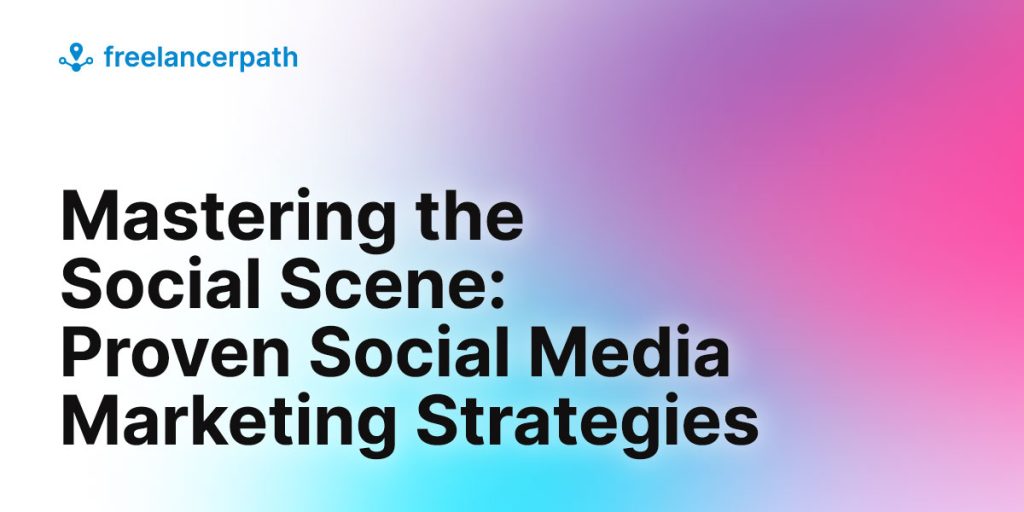Social Media Marketing Today
In the current digital age, social media has become a powerful tool for freelancers, transforming the way they market their services and interact with their clients.
The Importance of Social Media in Freelancing
For freelancers, social media provides a platform to showcase their work, skills, and expertise to a global audience. Whether it’s a writer sharing their latest blog post, a graphic designer displaying a new logo design, or a photographer posting a recent photoshoot, social media allows freelancers to create a professional online presence and attract potential clients.
Moreover, social media allows freelancers to engage directly with their audience, fostering relationships that can lead to future business opportunities. By sharing updates, responding to comments, and participating in relevant discussions, freelancers can build trust, enhance their reputation, and increase their visibility in their respective fields.
Social media also offers freelancers access to a wealth of information and resources, including industry news, trends, and insights, which can be invaluable in staying competitive and relevant in their fields. By following industry leaders, joining professional groups, and participating in online forums, freelancers can stay up-to-date with the latest developments and gain valuable insights into effective social media marketing strategies.
Understanding Social Media Marketing

Social media marketing refers to the use of social media platforms to promote a product, service, or brand. It involves creating and sharing content, engaging with the audience, and analyzing performance to optimize strategies.
Content creation is at the heart of social media marketing. It involves creating engaging, relevant, and high-quality content that can attract and retain a clearly defined audience. This can include blog posts, photos, videos, infographics, and more. For more information on creating engaging content, check out our article on social media content creation.
Engaging with the audience is another crucial aspect of social media marketing. This involves responding to comments, answering questions, and participating in conversations. By doing so, freelancers can build relationships with their audience, foster brand loyalty, and increase their reach.
Finally, analyzing performance and adapting strategies based on the results is a key part of social media marketing. This involves tracking key performance indicators (KPIs), such as likes, shares, comments, and followers, and using analytics tools to understand the impact of your efforts. For more information on tracking your social media performance, refer to our article on social media analytics tools.
In conclusion, social media marketing is a powerful tool for freelancers, allowing them to showcase their work, engage with their audience, and stay up-to-date with industry trends. By understanding and implementing effective social media marketing strategies, freelancers can enhance their online presence, attract potential clients, and grow their business.
Key Social Media Platforms
Understanding the nuances of different social media platforms forms the basis of effective social media marketing strategies. Each platform has its unique features, audience demographics, and content preferences. Here, we will discuss four key platforms: Facebook, Instagram, Twitter, and LinkedIn.
Facebook, with its vast user base, offers a golden opportunity to reach diverse audiences. The platform supports different types of content, including text posts, images, videos, and live streams. This makes it a versatile tool for freelancers to showcase their services, share valuable content, and engage with their audience.
Facebook also provides business-specific features like Facebook Pages and Groups that allow for community-building and networking. It’s an ideal platform to share updates, promote events, and encourage user interaction. For more on content creation for Facebook, see our guide on social media content creation.
Instagram is a visually oriented platform, perfect for freelancers in creative fields. It allows sharing of images, short videos (Reels), and longer videos (IGTV). Instagram Stories, a feature for sharing ephemeral content, is a fantastic tool for behind-the-scenes peeks, quick updates, and interactive elements like polls or questions.
The platform is also known for its use of hashtags, which can significantly boost post visibility. Instagram’s shopping features offer a seamless experience for businesses selling products. For service-based freelancers, it’s a great platform for showcasing work portfolio and testimonials.
Twitter thrives on real-time updates, making it a hotspot for news, trends, and public conversations. It’s ideal for freelancers wanting to establish themselves as thought leaders in their field. The platform allows for quick interactions with followers, networking with peers, and staying updated on industry trends.
Twitter threads (a series of connected tweets) are an excellent way to share in-depth content. Meanwhile, Twitter Chats (live Q&A sessions) can help engage the community and boost visibility.
LinkedIn is the go-to platform for professional networking. It’s especially useful for B2B freelancers. The platform allows sharing of professional accomplishments, industry articles, and thought leadership content. LinkedIn Groups provide opportunities for networking and discussion within specific industries.
LinkedIn also has robust job search features, making it a useful platform for freelancers seeking new projects. The platform’s professional atmosphere calls for a more formal tone and high-value content.
Understanding the strengths of each platform helps in tailoring content and communication style accordingly. This forms a crucial part of social media marketing strategies for freelancers. In the next sections, we will delve into these strategies and how to implement them on these platforms.
Proven Social Media Marketing Strategies
Success in social media marketing relies heavily on implementing proven strategies that resonate with your target audience. Here, we delve into three such strategies: content creation and curation, consistent branding, and audience engagement.
Content Creation and Curation
One of the most effective social media marketing strategies revolves around content. Creating high-quality, relevant content that aligns with your brand and audience interests is key. However, content creation doesn’t always mean generating original content. Curation, or the act of sharing valuable content from other sources, is also an essential part of a balanced content strategy.
The combination of creation and curation provides a diverse content mix that keeps your audience engaged and your brand at the forefront of their minds. It also positions you as a resource for valuable information, which can help to build trust and credibility with your audience. Tools for effective content creation and curation can be invaluable in this process. Check our guide on social media content creation for more details.
Consistent Branding
Consistent branding across all your social media platforms is another powerful marketing strategy. This involves ensuring that your brand’s visual elements (like color palette, logo, and images) and voice (the tone and style of your content) are recognizable and uniform across all platforms.
Consistency not only strengthens your brand recognition but also builds trust and credibility with your audience. Whether you’re posting an image on Instagram or updating your status on LinkedIn, your audience should be able to identify that the content is coming from your brand.
Engaging with Audience
Social media marketing is not a one-way street. It’s about creating a dialogue, not a monologue. Engaging with your audience – whether through responding to comments, liking their posts, or sharing user-generated content – can significantly enhance your brand’s image and build a loyal community.
Audience engagement also provides valuable insight into your audience’s needs and preferences, which can inform future marketing strategies. It shows your audience that you value their input and are open to conversations, fostering a deeper connection between your brand and your audience.
These strategies, when implemented properly, can significantly enhance your social media marketing efforts. However, they’re not set in stone. As the social media landscape evolves, so too should your strategies. Regular use of social media analytics tools can help you understand what’s working, what’s not, and how you can improve your social media marketing strategies moving forward.
Increasing Reach and Visibility
One of the main goals of implementing social media marketing strategies is to increase reach and visibility. There are several ways to achieve this, such as using hashtags, forming collaborations and partnerships, and investing in paid promotions and advertisements.
Utilizing Hashtags
Hashtags are an efficient way to categorize content and make it discoverable to a wider audience. They are used by social media platforms to group related content together, making it easier for users to find posts that match their interests. Using relevant and popular hashtags can significantly enhance the visibility of posts and increase engagement rates.
However, it’s important to use hashtags responsibly. Overusing hashtags can make posts appear spammy and reduce their credibility. It’s best to research and choose hashtags that are specific to the intended audience and the content of the post.
Collaborations and Partnerships
Collaborating with other freelancers or businesses can greatly enhance a freelancer’s social media presence. This could involve co-hosting events, sharing each other’s content, or even creating joint products or services.
Partnerships can also be beneficial for reaching a larger audience. By partnering with a business that has a complementary service or product, both parties can benefit from the shared exposure. This can lead to increased followers, higher engagement rates, and potential business opportunities.
Paid Promotions and Advertisements
Investing in paid promotions and advertisements can be a beneficial strategy for freelancers looking to increase their reach on social media. Most social media platforms offer advertising options that allow users to target specific demographics, ensuring that the content reaches the most relevant audience.
However, it’s essential for freelancers to track the performance of their paid promotions to ensure they’re getting a good return on their investment. This can be done using various social media analytics tools, which provide insights into engagement rates, audience demographics, and the overall performance of advertising campaigns.
By implementing these strategies, freelancers can significantly increase their reach and visibility on social media, allowing them to connect with a wider audience and potentially gain new business opportunities. For more insights into social media marketing, visit our guide on social media for small businesses.
Measuring Success and Adapting Strategies
In the ever-evolving world of social media, understanding how well your marketing strategies are performing is crucial. This involves monitoring key performance indicators, using analytics tools, and adjusting your strategies based on feedback and performance.
Key Performance Indicators (KPIs)
Key Performance Indicators, or KPIs, are measurable values that demonstrate how effectively a company is achieving its business objectives. In the context of social media marketing strategies, some common KPIs include follower growth, engagement rate (likes, shares, comments), and click-through rate.
| Social Media KPI | Description |
|---|---|
| Follower Growth | Measures the number of new followers over a specific period of time |
| Engagement Rate | Measures the percentage of your audience that interacts with your content |
| Click-Through Rate | Measures the percentage of people who click on your content’s link versus the total number of views |
It’s vital to identify the KPIs that align with your business goals and monitor these metrics regularly. This allows you to gauge the effectiveness of your current strategies and make necessary adjustments.
Analytics Tools
To track these KPIs, there are numerous analytics tools available that provide valuable insights into your social media performance. These tools can help you understand your audience behavior, identify content that resonates, and discover optimal posting times. For more on this, you can refer to our guide on social media analytics tools.
Adjusting Strategies Based on Feedback & Performance
One of the key aspects of successful social media marketing is the capacity to adapt. By regularly reviewing your KPIs and analytics, you can identify what’s working and what’s not. For instance, if a certain type of content consistently performs well, it might be beneficial to create more of it.
Similarly, if you notice that your engagement rate drops during specific hours, you might want to adjust your posting schedule. Our article on social media scheduling tools can provide further insight into how to effectively manage your posting times.
Furthermore, don’t underestimate the value of direct feedback from your audience. Comments, messages, and reviews from your followers can provide invaluable insights into their preferences and expectations.
By continually monitoring, analyzing, and adjusting your social media marketing strategies, you can ensure that your efforts are aligned with your business goals and resonate with your audience, setting the stage for sustained growth and success in the social media landscape. This approach is especially valuable for freelancers and small businesses where making the most of every effort in marketing is vital.



